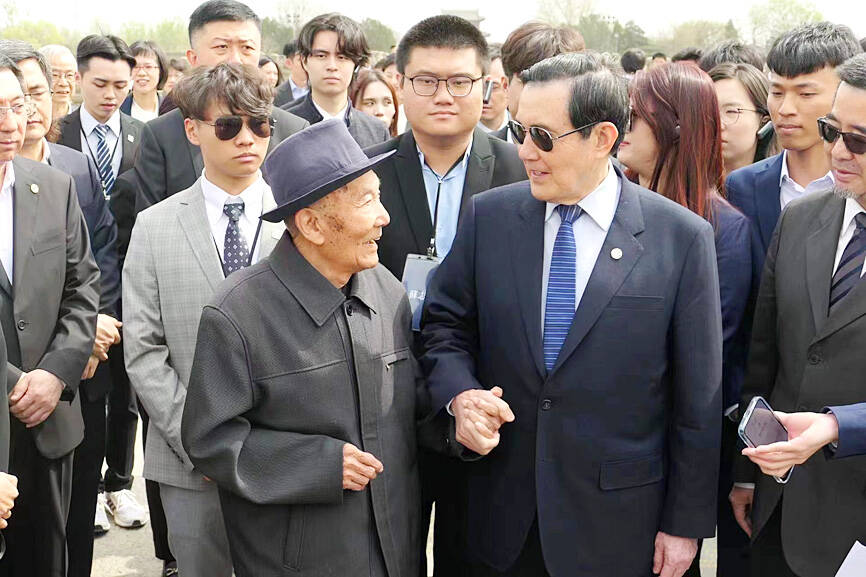Beijing finds “useful idiots” in every country as a means of confronting the West, an analyst said yesterday when commenting on a rumored meeting between former president Ma Ying-jeou (馬英九) and Chinese President Xi Jinping (習近平) tomorrow.
The meeting in Beijing would coincide with US President Joe Biden’s summit with Japanese Prime Minister Fumio Kishida in Washington.
Ma is being used as a pawn to arouse anti-Japan sentiment and advocate for unification with Taiwan, and could be discarded by the Chinese Communist Party at any time, said retired major general Yu Tsung-chi (余宗基), who served as the dean of the National Defense University’s Fu Hsing Kang College.

Photo courtesy of the Ma Ying-jeou Foundation
Beijing is attempting to arouse memories of the Chinese Nationalist Party’s (KMT) eight-year war of resistance against Japan in the first half of the 20th century, to elicit a sense of solidarity with the modern KMT and erode Taiwan’s relationship with Japan and the US, Yu told a radio talk show.
If Ma and Xi meet tomorrow, it would directly precede the Biden-Kishida summit, he said, adding that China always finds “useful idiots” in other countries to further its goals.
Not only Taiwanese, but also Chinese do not want to talk about Ma, fearing an association with “Chinese independence,” with “even Chinese companies shunning him,” Yu said.
Xi is using Ma as a pawn to present Japan as the common enemy of both sides of the Taiwan Strait, he said.
Xi knows it would be difficult to act against Taiwan militarily with Taipei’s defenses and the backing of its partners, which makes unification Beijing’s preferred option, he said.
The timing of the proposed meeting also coincides with the 45th anniversary of the US’ Taiwan Relations Act, Yu said.
The US is seeking to pull Japan into its plans to ensure stability in the Strait, with rumors that Washington is to appoint a four-star general in Japan to lead joint operations between the countries, he said.
This is a clear message to China that if it uses force against Taiwan, it would have to deal with the US and Japan, as well as US forces in the Philippines and South Korea, he added.
Meanwhile, the KMT is attempting to show it has open channels of communication with Beijing and Washington by sending KMT Vice Chairman Andrew Hsia (夏立言) to the US at the same time as Ma is in China, he said.
The Democratic Progressive Party has not done this, but “everyone knows” it is because China has chosen to give the KMT this platform, he added.
A second Ma-Xi meeting following their first in 2015 would be a major blow to Ma and the KMT, Yu said.
The party rarely criticizes Ma’s hypocrisy, “making it clear who is the one really defending the nation’s sovereignty,” he said.

Taiwan has received more than US$70 million in royalties as of the end of last year from developing the F-16V jet as countries worldwide purchase or upgrade to this popular model, government and military officials said on Saturday. Taiwan funded the development of the F-16V jet and ended up the sole investor as other countries withdrew from the program. Now the F-16V is increasingly popular and countries must pay Taiwan a percentage in royalties when they purchase new F-16V aircraft or upgrade older F-16 models. The next five years are expected to be the peak for these royalties, with Taiwan potentially earning

STAY IN YOUR LANE: As the US and Israel attack Iran, the ministry has warned China not to overstep by including Taiwanese citizens in its evacuation orders The Ministry of Foreign Affairs (MOFA) yesterday rebuked a statement by China’s embassy in Israel that it would evacuate Taiwanese holders of Chinese travel documents from Israel amid the latter’s escalating conflict with Iran. Tensions have risen across the Middle East in the wake of US and Israeli airstrikes on Iran beginning Saturday. China subsequently issued an evacuation notice for its citizens. In a news release, the Chinese embassy in Israel said holders of “Taiwan compatriot permits (台胞證)” issued to Taiwanese nationals by Chinese authorities for travel to China — could register for evacuation to Egypt. In Taipei, the ministry yesterday said Taiwan

‘LIKE-MINDED PARTNER’: Tako van Popta said it would be inappropriate to delay signing the deal with Taiwan because of China, adding he would promote the issue Canadian senators have stressed Taiwan’s importance for international trade and expressed enthusiasm for ensuring the Taiwan-Canada trade cooperation framework agreement is implemented this year. Representative to Canada Harry Tseng (曾厚仁) in an interview with the Central News Agency (CNA) said he was increasingly uneasy about Ottawa’s delays in signing the agreement, especially as Ottawa has warmed toward Beijing. There are “no negotiations left. Not only [is it] initialed, we have three versions of the text ready: English, French and Mandarin,” Tseng said. “That tells you how close we are to the final signature.” Tseng said that he hoped Canadian Prime Minister Mark Carney

POSITIVE DEVELOPMENT: Japan and the US are expected to hold in-depth discussions on Taiwan-related issues during the meeting next month, Japanese sources said The holding of a Japan-US leaders’ meeting ahead of US President Donald Trump’s visit to China is positive news for Taiwan, former Japan-Taiwan Exchange Association representative Hiroyasu Izumi said yesterday. After the Liberal Democratic Party’s landslide victory in Japan’s House of Representatives election, Japanese Prime Minister Sanae Takaichi is scheduled to visit the US next month, where she is to meet with Trump ahead of the US president’s planned visit to China from March 31 to April 2 for a meeting with Chinese President Xi Jinping (習近平). Japan and the US are expected to hold in-depth discussions on Taiwan-related issues during the